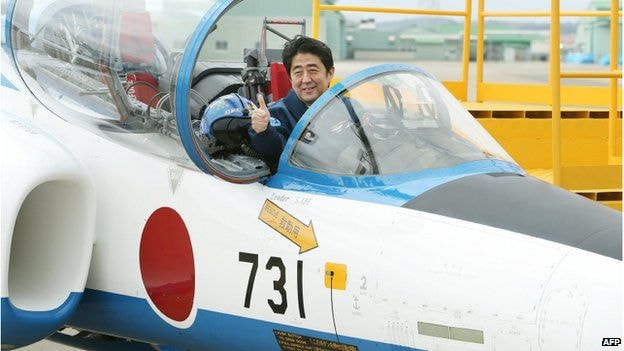Why does Japan "spend heavily" on defense when the economy is in recession?
(Baonghean) - As expected, the Japanese government has just approved the largest defense budget ever for the 2015 fiscal year, at 42 billion USD. Thus, Japan's defense spending in the new fiscal year will account for about 5% of the national budget. In the context of the economy of the Land of the Rising Sun falling into recession with worrying indicators in the last months of 2014, the government of Prime Minister Shinzo Abe "spending heavily" on defense is considered a strategic calculation.
With a budget of 4,980 billion yen, equivalent to 42 billion USD, Japan's defense budget for fiscal year 2015 will increase by 2% compared to last fiscal year, the third consecutive year of increase and a record high for the country. The defense budget for fiscal year 2015 gives priority to activities to protect the sovereignty of islands, especially the Senkaku Islands, which China also claims sovereignty over. Accordingly, the defense budget will spend a larger portion on activities to protect small islands, promote the purchase of fighter jets, transport aircraft, build military bases and move the US military base at Futenma.
 |
| Japan's defense budget increased for the third consecutive year and is at its highest level ever. Photo: AFP |
The plan to increase the defense budget was "revealed" by the Japanese government in the middle of last year. However, the fact that the defense budget was approved with the highest number ever, while the economy of the Land of the Rising Sun was in recession, the country's public debt was also the highest compared to developed industrial countries, made people surprised. Figures released in December 2014 showed that Japan's GDP had declined for two consecutive quarters. This was also one of the main reasons why the Japanese House of Representatives had to hold an early election.
Therefore, explaining the increase in the defense budget in the current context, analysts say that Prime Minister Shinzo Abe is giving special priority to reforming domestic security policy. In fact, although Prime Minister Abe has spent heavily on defense in recent years, Japan's defense budget is currently only about 1/3 of China's. According to the plan in the next 5 years, Japan will spend an additional 24,700 billion yen (more than 230 billion USD) for military purposes. The basis for this is that Prime Minister Abe's government must solve economic difficulties, so that it can increase the regular defense budget without affecting welfare spending as well as promoting the general economy. Currently, Tokyo is "confident" with the prospects of economic growth this year, predicting that the growth rate could be 1.5%, while being able to solve other difficulties of the economy.
It can be said that since taking office in late 2012, Japanese Prime Minister Abe has reversed the downward trend of Japan's defense budget over the previous 11 years. In the context of China emerging as a regional military and economic power and making moves to dispute sovereignty over the Senkaku/Diaoyu Islands in the East China Sea, the Japanese government believes that increasing the defense budget is necessary to "protect Japan's airspace, sea and territory" as well as the country's position regionally and internationally.
In addition, the current annual defense budget increase, at its highest level, is seen as a step toward realizing strategic changes in Tokyo's security and military under Prime Minister Shinzo Abe. Last year, Prime Minister Abe's cabinet changed the interpretation of Japan's pacifist constitution, which has been maintained for nearly seven decades. This change allows the Japanese military to defend allied countries. In addition, Prime Minister Shinzo Abe's administration is expected to pass a new charter on the provision of official development assistance (ODA) to foreign countries this week. Japan began providing ODA to developing countries about 60 years ago and has never provided aid for military purposes.
However, the new charter will lift this ban on the condition that ODA is only used for non-combat activities such as disaster relief and infrastructure development. Analysts say that the important changes in Japan's defense and security policy are all aimed at making Japan a "major military power". Japan wants to move from "dependent security" to "autonomous security", from "territorial defense" to "external engagement", from defense industry development to arms export... To realize the ambitions in defense and security policy, it is clear that increasing Japan's defense budget is not too difficult to understand. This is in line with Japan's strategic calculations in ensuring domestic security and strengthening its position in the region and internationally.
Thanh Huyen






